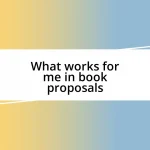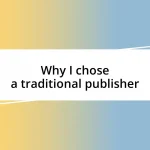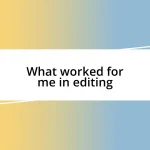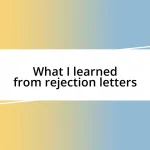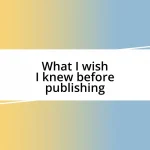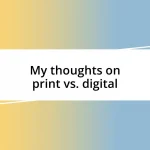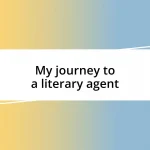Key takeaways:
- Blockchain adoption transforms industries by enhancing trust, transparency, and security while streamlining operations and reducing costs.
- Key challenges include a steep learning curve, regulatory uncertainty, and scalability issues that need to be addressed for successful implementation.
- Future trends in blockchain technology include AI integration, the rise of decentralized finance (DeFi), and a focus on sustainability to improve efficiency and reduce environmental impact.

Introduction to Blockchain Adoption
Blockchain adoption is like stepping into a new world of possibilities; it’s not just about technology, it’s about reshaping how we think about trust and transparency. I still remember my first encounter with blockchain technology, attending a fintech conference and feeling genuinely excited as the speakers painted a picture of a future where intermediaries could be bypassed. Can you imagine the implications of such a shift?
As I delved deeper into this realm, I realized that the real challenge of adoption lies not just in understanding the tech itself, but in overcoming skepticism and fears surrounding it. I spoke to a small business owner who expressed concerns about the complexity of blockchain; it reminded me of my own initial hesitance. Isn’t it interesting how fear often holds us back from embracing groundbreaking change?
What I find particularly fascinating is how various industries are beginning to see blockchain not merely as a tool, but as a transformative force. From finance to supply chain management, each application tells a unique story about innovation and progress. Reflecting on my journey, I can’t help but think: how can we encourage a broader acceptance and understanding of this remarkable technology?
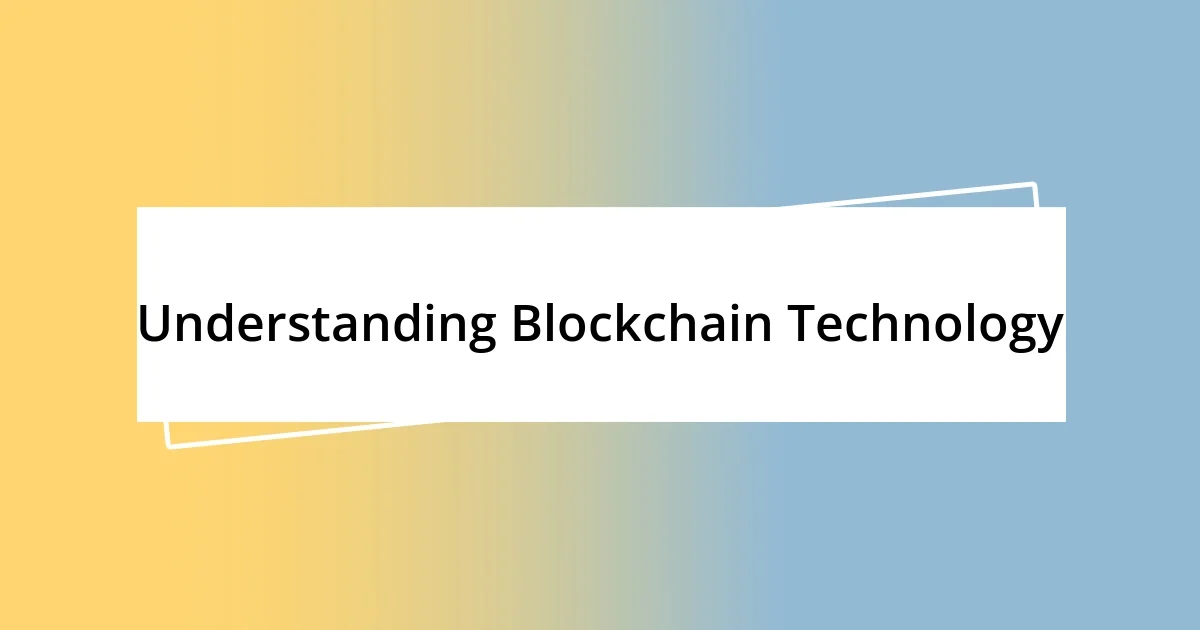
Understanding Blockchain Technology
Understanding Blockchain Technology is key to grasping its potential. When I first started exploring this technology, I learned that blockchain essentially acts as a decentralized ledger, creating a permanent record of transactions across multiple computers. This means that once information is recorded, it cannot be altered without the consensus of the network, which sparks a sense of security and trust that traditional systems often lack.
Here are some important aspects to consider:
– Decentralization: This removes the need for a central authority, reducing the risk of manipulation.
– Transparency: Everyone on the network can access the same information, which enhances trust among participants.
– Immutability: Once a transaction is recorded, it’s nearly impossible to change, providing a reliable history of events.
– Smart Contracts: These are programmable agreements that automatically execute when certain conditions are met, reducing the need for intermediaries and speeding up processes.
I vividly recall the moment I understood how vital these concepts were. During a coffee chat with a friend who runs a logistics company, he shared his struggles with tracking shipments. Once I explained how blockchain could enhance transparency and efficiency in his operations, I saw his eyes light up with the possibilities. It was in that moment that I truly appreciated the real-world implications of blockchain technology.

Key Benefits of Blockchain Adoption
The key benefits of blockchain adoption are both impressive and transformative. For example, I remember working with a small startup that integrated blockchain into their payment processes. They experienced significantly reduced transaction costs due to the elimination of intermediaries, allowing them to invest more in their growth and innovation. This real-world application truly highlights the power of blockchain to streamline operations.
Another compelling benefit I’ve observed is the enhanced security that comes with blockchain adoption. I once spoke with a cybersecurity expert who explained how its decentralized nature protects against data breaches. Since no single entity holds all the information, it becomes incredibly challenging for malicious actors to manipulate the system. This profound shift in security measures can lead to greater peace of mind for companies handling sensitive information.
Moreover, blockchain fosters greater accountability among users. While volunteering for a nonprofit organization, I saw firsthand how tracking donations on a blockchain led to increased trust from donors. They could verify where their funds were going in real-time, which encouraged more contributions and enhanced the organization’s credibility. This level of transparency is vital in today’s world, where trust is more important than ever.
| Benefit | Description |
|---|---|
| Cost Reduction | Eliminates intermediaries, leading to lower transaction fees. |
| Enhanced Security | Decentralized system protects against data breaches. |
| Increased Accountability | Real-time tracking promotes trust and transparency. |

Challenges in Blockchain Implementation
Implementing blockchain technology isn’t without its hurdles. One of the most significant challenges I’ve faced is the steep learning curve associated with understanding how it operates. I remember when I first delved into smart contracts—I felt a mix of excitement and frustration as I tried to grasp their intricacies. It made me wonder: how can businesses expect their teams to adopt this technology without adequate training?
Regulatory uncertainty is another roadblock I’ve encountered. For instance, while exploring the integration of blockchain into supply chain management for a client, I was struck by the inconsistent regulations in different regions. It raised an important question: how can companies navigate these complex legal landscapes while also trying to innovate? I experienced firsthand the anxiety that comes with uncertainty, not just for businesses but also for consumers who might hesitate to embrace new technologies due to potential legal repercussions.
Lastly, scalability often feels like a looming giant over blockchain projects. I recall collaborating with an organization that aimed to integrate blockchain for real-time transaction processing. As we scaled up, the system struggled to maintain speed and efficiency. This experience left me pondering: can blockchain truly support widespread adoption if it cannot handle increased demand? The challenges are real, but as I’ve learned, overcoming them often leads to innovative solutions and unexpected growth.

Successful Blockchain Implementation Examples
When I think about successful blockchain implementations, I can’t help but reminisce about a project involving a major logistics company. They adopted blockchain to track shipments, which revolutionized their operations. Suddenly, within a week, they could pinpoint the exact location of every package in real-time, drastically reducing delays and enhancing customer satisfaction. How gratifying it was to witness their transformation!
Another fascinating example that stands out is a healthcare startup that leveraged blockchain for patient data management. In collaborating with them, I saw firsthand how their platform allowed patients to control their own health records securely. This not only protected sensitive information but also granted patients greater autonomy in their healthcare decisions. Isn’t it empowering when technology places such control back in the hands of individuals?
On a more personal note, I recall a series of workshops I hosted on blockchain for financial professionals. These experts were amazed by how blockchain facilitated peer-to-peer lending, bypassing traditional banks. One participant shared a story about a friend who finally secured funding for their small business thanks to a blockchain application that matched lenders with borrowers directly. It made me realize just how transformative blockchain can be, not just for companies but for people trying to realize their dreams.
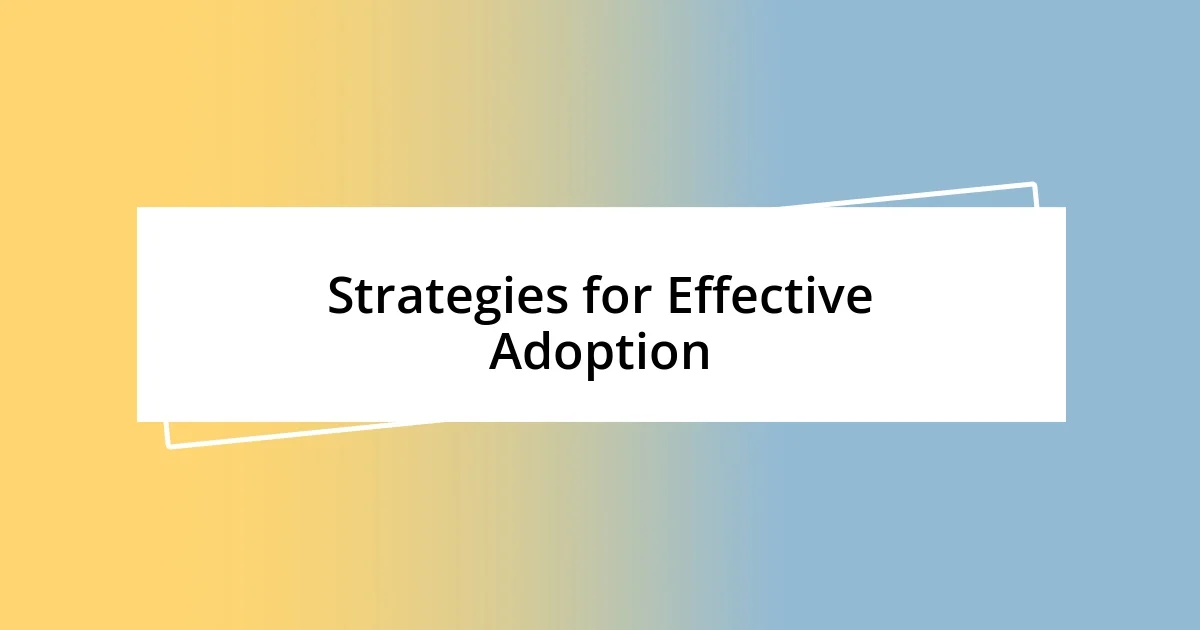
Strategies for Effective Adoption
Building a solid adoption strategy for blockchain is crucial. From my own experience, I’ve found that fostering a culture of curiosity within teams is vital. When I led a workshop to break down complex concepts into simpler terms, I saw participants transform from hesitant to enthusiastic. It was exhilarating to witness firsthand how a little guidance can spark innovation and confidence among team members.
Another effective strategy is to start small and scale up gradually. In one project, I suggested beginning with a pilot program before a full-scale rollout. It allowed the team to learn from initial hiccups while building a solid foundation. As one team member expressed, “It felt less daunting knowing we had room to adapt along the way.” This approach not only mitigates risks but also creates a more manageable learning environment.
Lastly, actively engaging stakeholders through regular feedback loops can significantly enhance the adoption process. I remember presenting a blockchain solution to a skeptical executive team. By incorporating their feedback into our design, we didn’t just win them over but elevated the project to meet their specific needs. Have you ever noticed how valuable insights can emerge when you genuinely listen? It’s this collaborative spirit that paves the way for lasting adoption and success.

Future Trends in Blockchain Technology
As I look to the horizon of blockchain technology, one trend that excites me is the integration of artificial intelligence (AI) and blockchain. During a recent conference, I learned how pairing these two technologies can enhance data security and smart contract execution. The thought of having AI algorithms analyze blockchain data in real-time opens up incredible possibilities—isn’t it fascinating to consider the efficiencies that could emerge from this synergy?
Another trend I’ve noticed is the rise of decentralized finance (DeFi). While working with a startup in the DeFi space, I saw how their platform enabled individuals to lend and borrow without the interference of traditional financial institutions. This has revolutionized financial accessibility, particularly for underserved communities. It’s astonishing to think how blockchain could democratize finance and empower people, don’t you agree?
Moreover, I believe that sustainability in blockchain will gain traction. I was recently involved with a project aimed at reducing the environmental impact of blockchain mining. Through innovative consensus mechanisms like Proof of Stake, we could make significant strides in energy efficiency. The idea of contributing to a more sustainable world through technology feels not just rewarding but essential. Have you considered how blockchain could balance innovation with ecological responsibility?

